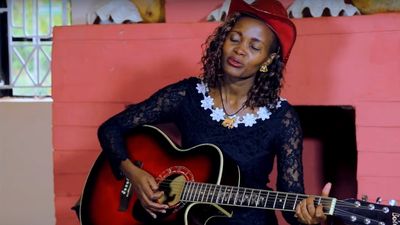Country Music Has a Home In Africa
African artists are taking a hold of country music narratives and making them their own.
Country music has a surprising amount of blackness woven into the fabric of its history.
While American-style country music might not seem like the thing to catch on in Africa, it became extremely relatable through the parallels between the lifestyles of many African countries and working class America.
The term country music has come to encompass many styles and genres, including folk, with origins that can be traced back to working class Americans who blended popular songs with Irish and Celtic fiddle tunes, ballads, cowboy songs and the musical traditions of various groups of immigrants.
Despite its clear popularity on the African continent and the influence of artists like DeFord Bailey—who was one of the genre's first black stars and an influential harmonica player—country music continues to be considered a mainly white genre and is still mostly imported from America.
This comes down mostly to what public radio stations play on the airwaves. Take Malawi for instance, where there's a radio station called MBC that devotes entire blocks to country music at a given time, but the music is nearly all from the United States. The program hardly plays music from anywhere else on the continent.
Kenya has also had extensive country music programming on the airwaves—the popularity of country music there dates all the way back to the 1940s when it was brought by colonialist during Kenya's occupation by the British. Both Kenya and Swaziland have music festivals dedicated solely to country and the prevalence of the acts at these festivals continue to be white and imported. But that's beginning to change.
Artists like Nigeria's Ogak Jay Oke, Emma Ogosi and Poor Charley Akaa have chosen to buck that trend, reclaiming those narratives for themselves and imbuing them with a truly African voice.
Young up and coming Kenyan country singer Esther Konkara, who felt particularly connected to the sounds of Dolly Parton, says she draws many comparisons between Parton's famous autobiographical track, "Coat of Many Colors," about growing up poor in a rural area and her own village upbringing. In Malawi, gospel artist Allan Ngumuya took inspiration from the '50s & '60s era of country music and started fusing country with gospel music.
Kenyan country star Elvis Otieno also cites that era as his inspiration. His humble beginnings are something straight out of a country song. He was born in a small town on Western Kenya's railroad line. His father was a Pentecostal preacher who played gospel music on the guitar, but it was seeing Shania Twain in concert when he visited the U.S. that served as a catalyst for him to return to Kenya in 2003 and become the most successful country musician in the country.
Those elements emerge strongly in South African artist Bongizizwe Mabandla's sound. Singing in his native tongue of isiXhosa, he regales his audience with tales of his upbringing in the small town of Tsolo in the Eastern Cape. He uses the oral traditions of amaXhosa to expand on ideas of identity, culture and spiritually but he cautions against pigeonholing his music in the "Afro-folk" category.
ESwatini Country Music Festival coordinator Siphesihle Nkwanyana references Swati country legends Buddy Masango and Isaac Gamedze as paving the way for new artists like Dusty & Stones, who were awarded the 2017 Texas Sound International Country Music award for Best Duo. Back in Kenya, another local artist Carlos Piba says he hopes to record country music in Swahili one day.
This all marks a transition in the production of country music: we're exporting it now.
- Interview: Award-Winning Eswatini Artist Mzwaa is Shifting The Paradigm - OkayAfrica ›
- Maya Amolo Wants You to Embrace Love - OkayAfrica ›
- 10 Afro-Gospel Songs You Should Know - OkayAfrica ›
- The 13 Songs You Need to Hear This Week - Okayplayer ›
- The 13 Songs You Need to Hear This Week - Okayplayer ›
- 7 African Country Musicians You Should Check Out - Okayplayer ›
- Shaboozey: How An Igbo Man Came to Rule American Country Music - Okayplayer ›
